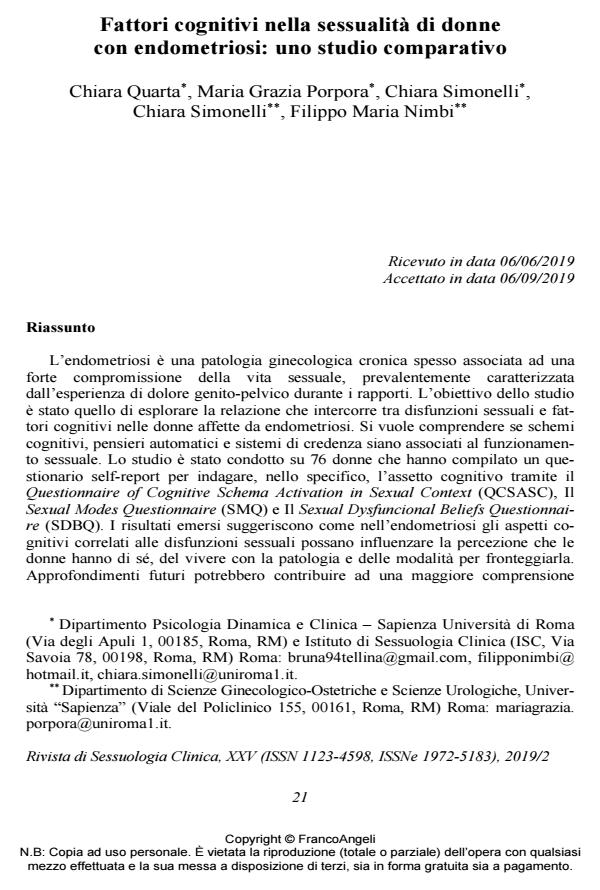Cognitive factors in sexuality of women with endometriosis: a comparative study
Journal title RIVISTA DI SESSUOLOGIA CLINICA
Author/s Chiara Quarta, Maria Grazia Porpora, Chiara Simonelli, Filippo Maria Nimbi
Publishing Year 2019 Issue 2019/2
Language Italian Pages 18 P. 21-38 File size 233 KB
DOI 10.3280/RSC2019-002002
DOI is like a bar code for intellectual property: to have more infomation
click here
Below, you can see the article first page
If you want to buy this article in PDF format, you can do it, following the instructions to buy download credits

FrancoAngeli is member of Publishers International Linking Association, Inc (PILA), a not-for-profit association which run the CrossRef service enabling links to and from online scholarly content.
Endometriosis is a chronic gynecological disease often associated with a strong impairment of sexual life, mainly characterized by the experience of genital-pelvic pain during intercourses. The literature highlighted that endometriosis mainly af-fects the female reproductive system and, therefore, has a strong impact on sexu-ality, on gender identity, on the quality of a woman’s relational and mental life. The present study arises from the intention to deepen the cognitive health situation of women with endometriosis. The aim of the current study was to explore the re-lationship between sexual functioning and cognitive factors in women with endo-metriosis. In particular, we focused on the association of sexual functioning to cognitive schemas, automatic thoughts and sexual dysfunctional beliefs. Data were collected in two groups of women: 35 patients in child-bearing age (age range 18-45 years, M=34.83 SD=7.70) with a diagnosis of endometriosis (verified by laparoscopy) belonging to the department of Gynecology and Obstetrics of the Policlinico Umberto I and 41 healthy women from the general population. The women completed a self-report questionnaire assessing cognitive structures through the Questionnaire of Cognitive Schema Activation in Sexual Context (QCSASC), the Sexual Modes Questionnaire (SMQ) and the Sexual Dysfunctional Beliefs Questionnaire (SDBQ). In the analysis of the data emerged from the QCSASC, women with endometriosis showed a greater activation of negative cog-nitive patterns related to the sense of impotence compared to the control group. This result could be linked to the data emerging on the access to seek help for sex-ual problems: only 26.7% of women in the clinical group with sexual difficulties underwent or have undergone a specialist consultation in the past, compared to 80% of women in the control group. It is reasonable that women with endometrio-sis have more difficulties in seeking help, maybe because of the rigid and dysfunc-tional cognitive schemes related to the sense of impotence on their condition. The women from the clinical group reported a greater number of beliefs related to "sexual conservatism" and a tendency towards the "affection primacy" compo-nent. In the literature, conservative attitudes towards sexuality and unrealistic ex-pectations about sexual performance are commonly associated with sexual diffi-culties in women and men. In conclusion, the results of our study seem to indicate that in endometriosis the cognitive aspects related to sexual dysfunctions may play an important role in influencing the perception what a woman is experiencing, of her identity and of her relational situation. Further in-depth investigations could contribute to a better understanding of the impact that this pathology has on sex-ual health, on the quality of life and thus direct towards a more appropriate target-ed intervention under the biopsychosocial model.
Keywords: Endometriosis, sexuality, cognitive schemes, automatic thoughts, belief systems.
Chiara Quarta, Maria Grazia Porpora, Chiara Simonelli, Filippo Maria Nimbi, Fattori cognitivi nella sessualità di donne con endometriosi: uno studio comparativo in "RIVISTA DI SESSUOLOGIA CLINICA" 2/2019, pp 21-38, DOI: 10.3280/RSC2019-002002